














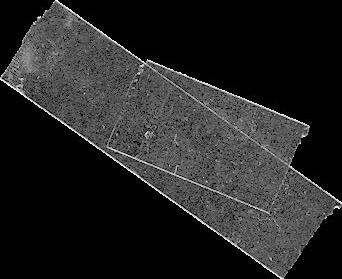
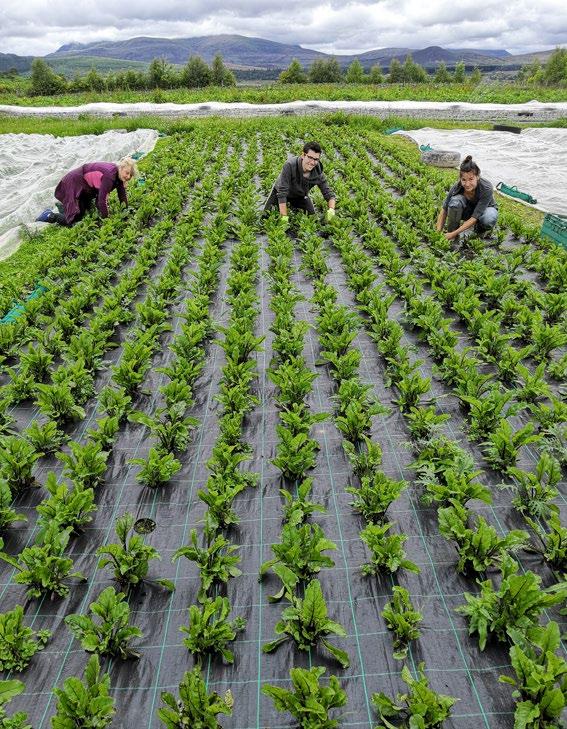
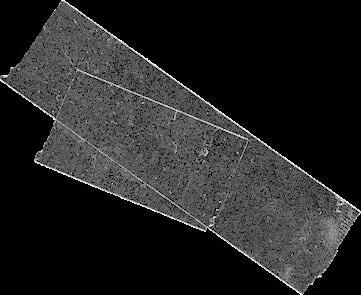
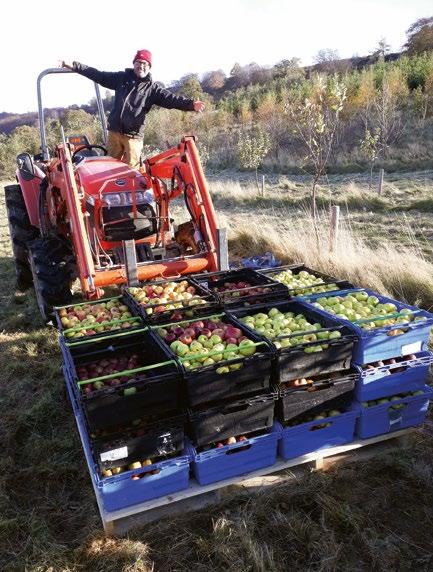

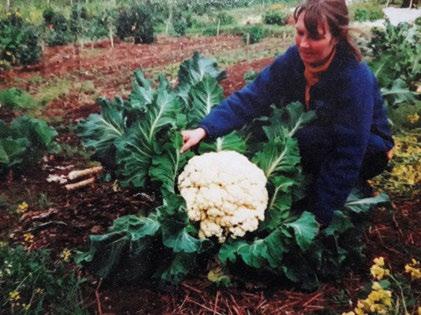



The production of food, fibre and fuel in Scotland finds itself at a crossroads. Faced with climate and biodiversity crises and food and health inequalities, now is the time to choose a sustainable approach which supports agroecological practices and genuinely local production.
The Covid-19 crisis has highlighted the need for and many benefits of genuinely local production, which is more resilient to supply chain disruptions. However, the United Kingdom only grows approximately 60% of the food that it eats,1 and dependence on imports is even higher for vegetables and fruit (47.5% and 84% respectively imported).2 Less than 10% of land in Scotland has been classified as suitable for growing crops, but whilst large amounts of nutritious food could be grown in small spaces, 3 we use ¾ of our land to grow cereals with ½ of cereals going to livestock feed and to the production of beer and whisky.4 Agroforestry and organic production have great potential in the Scottish context, notably in combination with livestock, but uptake is still limited and only 2.1% of agricultural production in Scotland is organic.5
Scottish law and policy has not been doing enough to promote agroecological production, nor support the great diversity of people who want to produce good food, fibre and fuel in Scotland. Rural land accounts for 98% of Scotland’s land area - 50% of which is owned by only 432 families (0.008% of the population),6 and the inability to access land has been identified as the primary barrier to entry for new entrant farmers.7 At the same time, we are losing land at 1200 hectares a year, 8 and our workforce is in decline.9 A lack of opportunities for training and skills development in agroecology constrain opportunities for the upscaling of genuinely local production efforts.
Scotland’s current land use patterns are having negative impacts on the environment and communities that rely on the land. The agricultural sector contributes to 26% of Scottish greenhouse gas emissions, including 68% of methane and 79% nitrous oxide emissions10 , and emissions from land use saw only minimal annual reductions over the last decade.11 Intensification of agriculture and the loss of traditional and sustainable practices have been held responsible for loss of biodiversity and habitats, and impacts on soil and water quality.12
We can no longer continue in this way.
But it also does not need to be this way. The production of food, fibre and fuel can make positive contributions to climate change mitigation and biodiversity enhancement. The next term of Scottish Parliament 2021-2026 brings opportunities to rethink how law and policy can effectively support agroecological practices, reward the producers of good and genuinely local food, fuel and fibre and allow everyone in Scotland to enjoy the products of the land.
May 2021
A UNION OF LAND-BASED WORKERS

OUR WORK IN SCOTLAND
Founded in 2013, The Landworkers’ Alliance is a union of farmers, growers, foresters and land-based workers with a mission to improve the livelihoods of our members and create a better food and land-use system for everyone. We operate across the UK and represent more than 1500 agroecological farmers and landworkers. We are a member of La Via Campesina: an international organisation of over 200 million peasants, small-scale farmers and agricultural workers unions around the world. We work together to achieve a global vision of agroecology, food sovereignty and sustainable forestry.
The Landworkers’ Alliance is a democratic, member-led union, run by producers for producers. Our policies, representation and training come from farmers, growers, crofters, foresters and land-based workers who have direct experiences of the issues we work on. We work for a future where producers can work with dignity to earn a decent living and everyone can access local, healthy and affordable food, fuel and fibre.
“The Landworkers’ Alliance is an ally that we can work with. A lot of our aims will be the same, but crofting is very defined by the law and geographically so others will need a voice of their own.”
Patrick Krause, Chief Executive at the Scottish Crofting Federation
The Landworkers’ Alliance first came together in Scotland in November 2018, at the Project Café in Glasgow. We were inspired by the enthusiasm of the many people that came together that day and we have, since then, organised several ‘meet-ups’. These include a FarmHack at Tombrek Farm in Perthshire, organised together with the Soil Association, and a meeting at East Neuk Market Garden in Fife, organised together with the CSA Network.
We currently have more than 120 members across Scotland. We saw nearly 100% growth of our membership in 2020 and anticipate to continue this trend as our membership activities are now supported by a new Scotland Membership and Outreach Coordinator.
The work of the Policy and Campaigns Coordinator for the Landworkers’ Alliance in Scotland is supported by a Committee of Members with representatives for each of nine different regions (Argyll & The Islands, Ayrshire, Dumfries & Galloway, East Central, Forth & Clyde, Lothians & Borders, North East, Highlands, Orkney & Shetland). The Committee came together in March 2021 to provide input into and support for the development of this manifesto.
In 2021, we will set up a Panel of Experts with academic advisors, to further support our work, as well as a Coordinating Group to streamline the activities of the Landworkers’ Alliance in Scotland. One member of staff has also been elected to represent the interests of our Scottish members on the UK-wide Coordinating Group of the Landworkers’ Alliance.

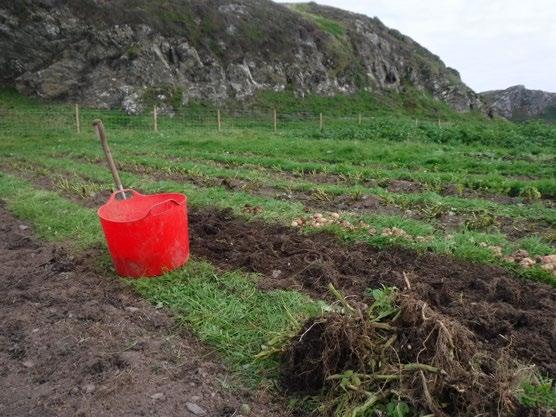
AGROECOLOGY

“All farmers should be producing food and nature. Small farms produce food and nature and community, and they should be supported in doing that.”
Pete Ritchie, Director at Nourish Scotland
Agroecology describes holistic ways of producing food, fuel and fiber that integrate sustainable food and resource production with environmental land management.
Agroecological farming and land management is place based, sustainable and deeply integrated with the local community, ecology and environment. But agroecology is more than just a set of agricultural techniques. As a framework for ecologically, economically and socially regenerative agriculture systems, it advocates democratic, social and political relationships that are based upon principles of inclusiveness, equity and justice.
Agroecology is recognised by the Food and Agriculture Organisation of the United Nations (FAO), and has been endorsed by the former UN Special Rapporteur on the Right Food and the The International Panel of Experts on Sustainable Food Systems (IPES Food).
“Where we talk about agroecology, the farmer is part of the ecosystem. We need to think about how we treat the people that work on farms. The people are an intrinsic part of farming and I think that this is often lost when we talk about farming, but this human element is key.”
Nikki Yoxall, Sustainable Farming Lead at the Nature Friendly Farming Network and member of the Landworkers’ Alliance

1
Agriculture should focus on producing food to feed people rather than as inputs for the global commodity market. This means guaranteeing the right to food to ensure that everybody, regardless of income, status or background, has secure access to enough nutritious, culturally appropriate, good food at all times.
2
The people who produce and provide our food should be properly rewarded, protected and respected. This means decent living wages, secure contracts, fair representation and good working conditions for everyone involved in getting food from the field to our plates.
Good food should be easily accessible in both rural and urban areas, through numerous local outlets. This means genuinely local provision and short food supply chains should be prioritised over imports wherever possible. International trade should serve the rights of all people to safe, healthy and ecologically sustainable food production and ensure that we do not undermine food sovereignty.
Control over the resources to produce, distribute and access food should be in the hands of producers, communities and workers across the food system. Civil society should be at the centre of policy-making, with the power to shape the way the food system functions and influence the policies and practices needed to transition to a just food system.
The knowledge and skills needed to produce, process, distribute, and prepare food should be protected and invested in. The cultures of food producers and communities should be valued, including the ability to develop and pass on knowledge and skills to future generations.
3 4 5 6
Food production and distribution systems should protect natural resources, reduce environmental impact and work in harmony with nature. Agroecology should be the basis for food production, where food is produced within the finite limits of our planet’s resources, protecting and respecting our environment and communities, and without compromising the ability of future generations to provide for themselves.

The Landworkers’ Alliance in Scotland calls upon the Scottish Government and its public agencies to:
1 Value local food, fuel and fibre and agroecological farmers, crofters, growers and foresters
2 Make food sovereignty and food justice a reality 3 Diversify land ownership and provide access to land 4 Reform subsidies and support agroecological farming and land management 5 Create local food economies and reward good food 6 Restrict GMOs and
Recognise the potential of genuinely local food, fuel and fibre production, and the value of agroecological farmers, crofters, growers and foresters.
The Landworkers’ Alliance calls for a change of direction for the Scottish food and land-use system, moving away from a focus on exports to recognise food and land as being much more than commodities. Scotland can and should grow and produce genuinely local food, fuel and fibre within communities, for communities.
Small and medium-scale agroecological farmers, crofters and growers can grow healthy and nutritious food whilst, simultaneously, making positive contributions to climate change mitigation and biodiversity enhancement. A focus on genuinely local food, fuel and fibre production also avoids ‘leakage’ of carbon and other social and environmental impacts of certain types of food production to other countries. Food production and farming are the cornerstones of many local communities, and a focus on local production can bring communities together and support rural development and employment.
The Landworkers’ Alliance calls upon the Scottish Government and its public agencies to: l Set out and lead a vision for small to medium-scale agroecological farmers, crofters, growers and foresters serving local communities, as the main way for Scotland to provide for its needs.
l Set headline targets in the program for government that aim to ensure that by 2026:
Ǝ The amount of food that is both grown and eaten in Scotland is increased by 20% and a large proportion of this is grown, sold and eaten locally, within the same region.
Ǝ At least 50% of farmers, growers and foresters are supported to transition towards agroecology.
Ǝ At least 500 agroecological new entrants are enabled to start farming, growing, crofting or forestry work.
Ǝ The percentage of food grown organically is increased by 25%.
Ǝ Scotland has become domestically self-sufficient in forestry products.

Make food sovereignty and food justice a reality through law and policy reform.
The Landworkers’ Alliance calls for the adoption of a whole system approach to the regulation of food, agriculture and land use, which promotes the wellbeing of people and planet in tandem and recognises the potential of agroecological and agroforestry practices to contribute both to local food production and targets related to biodiversity protection and climate mitigation. Good food should be accessible to everyone in Scotland, and those working in agriculture and food should be able to earn a decent living and work in dignity.
A Good Food Nation Bill should provide a cross-cutting legislative framework which supports food producers with fair compensation, safe working conditions and access to land and markets and ensures that everyone has dignified access to nutritious and sustainable food.
The Landworkers’ Alliance calls upon the Scottish Government and its public agencies to:
l Adopt a Good Food Nation Bill which incorporates the Right to Food into Scots law and which is founded upon principles of agroecology and food sovereignty.
l Establish an independent, statutory Scottish Food Commission to ensure implementation across government departments and public agencies.
l Place duties on local authorities to contribute to the aims of the framework.
l Include binding targets to secure immediate action for the most pressing issues.
l Develop National Food Plans at regular intervals through inclusive processes, and support the development of regional food plans as a part of the remit of the Regional Land Use Partnerships.
3

Diversify land ownership and provide access to land and housing for small and medium scale agroecological farmers, growers and foresters.
Being unable to access land is a key barrier for many of our members in Scotland. This is driven by many factors including the high cost of land, large size of plots, lack of affordable housing and a very low availability of long-term tenancies and other secure tenure options. An overarching factor in all of these is the high level of concentrated land ownership in Scotland, which continues to increase. Scottish law has not done enough to address this high concentration of land ownership.
The Landworkers’ Alliance calls upon the Scottish Government and its public agencies to:
l Increase the amount of publicly owned land available for agroecology by setting a target of 3000 hectares of publicly owned land by 2026 available to new entrants, with a strengthened focus on agroecological business models. Review longer-term secure opportunities under the work done by the Farming Opportunities for New Entrants (FONE) Group.
l Support community landowners to make land available for agroecology by renewing and doubling the value of the Scottish Land Fund (SLF) and supporting community supported agriculture initiatives.
l Commission research ionto the impacts of market value transfers for communities.
l Improve the democractic functioning of our planning system by strengthening local place plans and including farming and local supply chain infrastructure.
l Monitor loss of agricultural land and greenbelts and set preventive targets and create a public interest test in sale and/or change of use from agricultural land.
l Reform inheritance tax and cap the maximum amount of land owned by any one individual or private company.
l Create affordable housing within rural communities and limit the number of properties that can be bought as second or holiday homes and explore measures which would disincentivise disaggregation of farm houses from farm land.
4
Provide financial support for small and medium scale, agroecological farming, crofting, growing and forestry and tackle law and policy barriers to genuinely local production.
Future farm support provides an opportunity to transition our food and land-use system to a system that produces good food, fuel and fibre, protects and enhances biodiversity and helps address the climate crisis. Small- and medium-scale, agroecological farming, growing and forestry and genuinely local production of food, fuel and fibre can contribute to all of these objectives and should thus be supported by Scottish law and policy measures.
The Landworkers’ Alliance calls upon the Scottish Government and its public agencies to:
l Cap the maximum amount of basic support payments and make current basic support payments accessible to small farmers, crofters and growers.
l Increase current spending on rural development support and agri-environmental schemes, with a focus on support for agroecology and agroforestry.
l Recognise the value of new entrant grant schemes and undertake a review of the
previous scheme with the aim of establishing and implementing an improved version.
l Ensure that a new package of agricultural payments is centred around the objectives to protect biodiversity and address climate change, provides for greater equity among food producers and consumers and supports transitions to agroecology.
l Allow for flexibility and derogation from food safety and hygiene requirements for small farmers, crofters and growers and direct sales, in support of genuinely local food production.
l Adopt a new Organic Action Plan for Scotland which recognises and addresses the barriers to organic production and certification for small scale farmers, crofters and growers.
5

Genuinely local food production may bring communities together and can help achieve climate targets by reducing food miles, enhancing the seasonality of diets and limiting packaging. Yet, the lack of economies of scale of local, year-round food production and the failure to internalise the costs of the negative environmental impacts of industrial farming in the price of food products, puts many local producers at a competitive disadvantage.
The Landworkers’ Alliance calls upon the Scottish Government and its public agencies to:
l Work together with local authorities, farmers, crofters and growers and financing organisations to implement food procurement plans with a view to source at least 50% of ‘public food’ from genuinely local and/or agroecological or organic sources, giving priority to small scale farmers, crofters and growers.
l Improve local infrastructures, including (local or mobile) abattoirs, processing and storage facilities, distributions hubs, food waste recycling and wholesale markets.
l Put in place measures for tax and business rates relief in support of agroecological and genuinely local food, fuel and fibre production.
l Set targets for retailers as to the percentage of genuinely local (and agroecological) products on sale and display.
l Implement polluter-pays-principle for law and policies on food and agriculture.
6
Continue to strictly regulate the use of GMOs for food and agriculture and focus efforts on local breeding programmes and heritage seed production.
Scotland’s status as a proud GM-free nation is under threat by England’s plans to deregulate certain types of GMOs, creating problems for food producers in Scotland due to risks of cross-contamination, competition from GM products and restrictions on access to markets.
The Landworkers’ Alliance calls upon the Scottish Government and its public agencies to:
l Continue to restrict the cultivation of GM crops in Scotland and promote Scotland’s status as a GM-free nation.
l Engage with farmers, crofters, growers and foresters to provide adequate protection against the risks of different regulatory approaches to GMOs and GM products within the UK internal market.
l Take a stance against the patenting of plants derived from conventional breeding.
l Boost small-scale production of seeds and participatory breeding programmes in Scotland and support research into heritage and locally adapted varieties.

Educate and train new generations of Scottish agroecological farmers, crofters, growers and foresters and increase the diversity of people in the land-based sectors.
Food and agricultural education and training are intrinsically linked. Giving children and young adults the skills necessary to grow, choose and prepare nutritious food does not only provide benefits related to physical and mental wellbeing, but also provides foundations for the creation of a new, diverse generation of conscious farmers, crofters, growers and foresters.
Increasing the visibility and accessibility of the food and agricultural sector, especially with regard to young people who may lack exposure, is crucial to increase diversity in farming, crofting, growing and forestry work.
The Landworkers’ Alliance calls upon the Scottish Government and its public agencies to:
l Continuously build the skills of students across primary and secondary schools to grow food without use of chemicals and to prepare nutritious and tasty meals.
l Create direct connections between children and agroecological farmers, crofters, growers and foresters through programmes that support hands-on learning.
l Offer a National 5 and Higher qualification in organic/agroecological food, farming and forestry in every school.
l Support the creation of a funded degree course in local and agroecological food.
l Provide funding to cover salary and NI payments for interns/trainees employed by small and medium scale agroecological farmers, crofters, growers and foresters.
l Recognise and strengthen the diversity of our farm workforce by providing more support to women and all gender identities, and monitoring ethnicity of the farming population in the Scottish Agricultural Census.
l Appoint diversity champions to challenge perceptions of who farmers, crofters, growers and foresters are.
Enhance the transparency of decision-making processes in relation to food and agriculture and provide meaningful and equal opportunities for participation.
This is a crucial time for the future direction of agriculture, food production and land management in Scotland. An ambitious sustainable vision and approach is required to reconnect the Scottish people with food and address the climate and biodiversity crises.
Now, more than ever, it is essential that all voices are heard and valued in debates on regulatory reform. The transparency of policy making processes is of the essence and the Scottish authorities should provide meaningful and equal opportunities for participation.
The Landworkers’ Alliance calls upon the Scottish Government and its public agencies to:
l Set up a new consultation mechanism between government, agroecological farmers, crofters, growers and foresters, NGOs and communities to ensure that all relevant legislation and policy on food and agriculture is designed and able to assist the operation, sustainability and expansion of agroecological farming, crofting and genuinely local production of food, fuel and fibre.
l Create a standing committee of agroecological farmers, crofters, growers, foresters and other local food producers to meet quarterly with the Scottish government.
l Call upon the relevant committees of the Scottish Parliament to review the state of agroecological farming, growing, crofting and forestry work in Scotland, take evidence, make recommendations for future actions and report its findings and recommendations to the parliament.



We currently farm in the North East of Scotland, with a herd of rare and native breed cattle, exploring the integration of livestock into a small farm ecology. Across 18 acres of our own land and over a hundred acres of neighbouring land that we graze, we use holistic management to manage for increased biodiversity and ecological functioning.
What we have observed confirms to us that livestock play an important role for healthy soil, plants and wildlife. We believe agroforestry, holistic planned grazing and pasture fed livestock can restore ecological functionality and produce delicious, nutritious beef. We are working hard as graziers to produce the meat we would want to share with friends and family, at all times respecting our animals, trusting and learning from them, guided by nature.

We are really excited to be moving to a new farm later this year. We have managed to secure a tenancy which gives us greater long term security and will allow us to develop plans for a cow/ calf micro dairy and pastured poultry, as well as continuing with agroecological beef production.
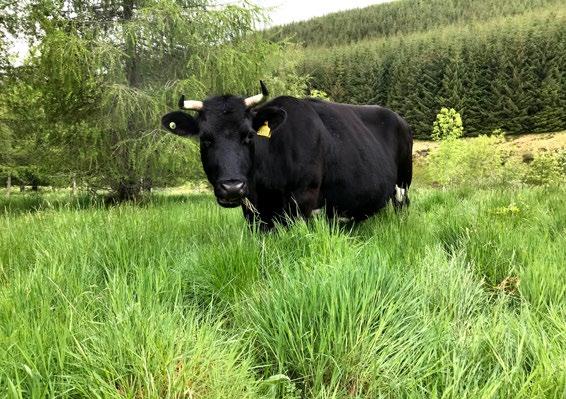
OUR CONNECTION TO THE LAND
“Being involved in work that focuses on enabling abundance and diversity to nourish people is an incredible privilege.”
Moving the cattle between their mob grazing paddocks is our favourite job on our farm. We get to observe the animals individually and check for signs of health, and there is a chance to observe and respond to their impact on the ground, dynamically adjusting the grazing plan. It also gives a chance to build a relationship with the animals which is key to quiet and safe handling.
Being involved in work that focuses on enabling abundance and diversity to nourish people is an incredible privilege. Being connected to the land, working with animals, contributing to the health and wellbeing of them and the land is an absolute joy!


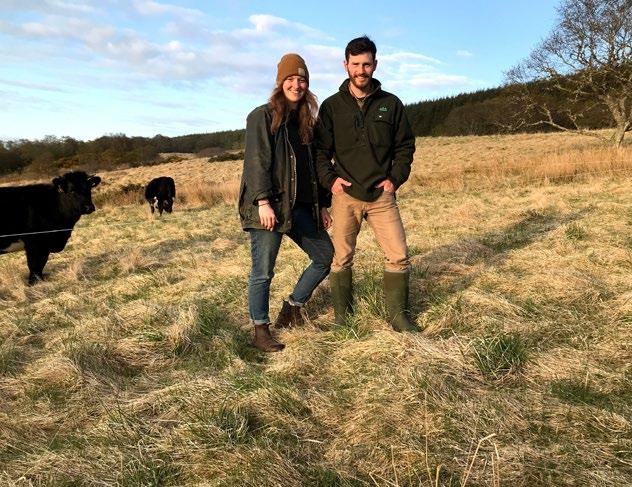
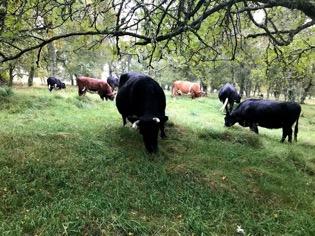

“Farmer autonomy is a key part of a sustainable food system.”
LAND ACCESS AND POLICY SUPPORT
For us, agroecology is based around considering the farm as an ecosystem, using biological principles and biomimicry to be productive whilst enabling natural processes. It also takes into account wider social, economic and political contexts of food supply, land access and rural communities. For us this means that decisions we make need to be checked against our holistic context and that we always think about energy flow, water and nutrient cycling and community dynamics when planning activity on the farm.
Land access has been a challenge, but one we overcame by developing a grazier business that has given us a vehicle for working in collaboration with neighbouring land owners. The challenges we face now are working within a policy and funding framework in Scotland that does not appear to promote agroecological agriculture and prioritises greenhouse gas emissions over biodiversity loss when nature-based solutions could be put in place to mitigate both.
Research tells us that agri-environmental financial support for farmers leads to greater financial sustainability, and that farmer autonomy is a key part of a sustainable food system. Policy that promotes these elements would help the work of agroecological farmers implementing land sharing practices.

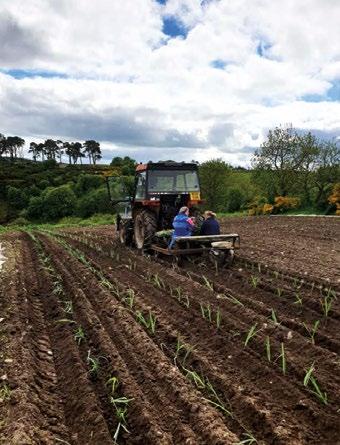




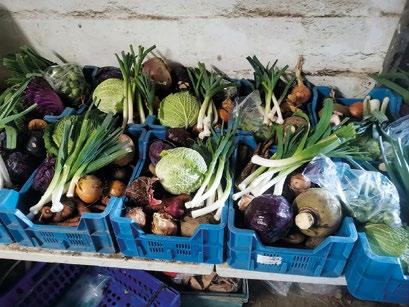
We have a 40 acre farm three miles north of Stonehaven. We had Demeter biodynamic certification for 25 years and now farm without the certification but still use the biodynamic preparations on the vegetables and all of our customers are aware that we grow to a high standard of care. At present we grow four acres of field vegetables, the rest of the farm is in grass and our daughter runs a livery yard. This works well for us, as the grass for the horses is used to make haylage for winter feed and we get most of the dung for the vegetables from the horses. The vegetables are rotated round the grass fields on a 4-5 year rotation. We grow a full range of vegetables which we sell in farmers markets and a weekly delivery. We do not buy in any produce so our season is from July-March.
Our impulse is always to produce food that is healthy for people and heals the earth. We keep the fertility of the fields at an optimum level and have planted two miles of hedges and woodland. We feel this is how agroecological farming can be done and respect that every farm or smallholding is different.
We are very fortunate to own our farm, having bought it when land prices very much more affordable. Our main challenge has been making a fair living for the amount of time and care we put in. Investing in the farm is difficult for the same reasons and we sometimes struggle to find workers when we need them during weeding season. The growing has also been more challenging due to changing weather patterns caused by climate change.
I think land workers have to love the work and the outdoor life and this is the case for us. Sometimes it is very challenging with the weather and other problems but we can always feel joy in the changing seasons and what they bring; getting the land ready, sowing, looking after the growing crops and harvesting. One of my favourite jobs is harvesting carrots which we do by hand with help of an undercutter, this starts in the Autumn right through the winter.
We hope that policy makers will recognise the true value of the small producer, not only for their produce but also the beneficial effect on the biosphere and as a social enterprise through connecting people to their food. It would be helpful to get support with investments and staff trained in agroecology. We are expanding our area of veg this year due to the demand for home deliveries but we have to be realistic in how much we can do.






“By supporting the health of the land in this way to grow the plants that support the health of people, I see agroecology in action.”
I am a qualified herbalist and I run a micro herb farm in Falkland, Fife, which is on the site of Meadowsweet Organics market garden and CSA. I maintain a plot of 11x 30 meter beds of medicinal herbs, which I grow for making the herbal medicines I use in my herbal clinic and for dispensing to clients. I also grow herbs for drying and making into herbal remedies including herbal tea blends, infused oils, balms and syrups. I save herb seeds and manage a separate propagation area for growing potted medicinal herb plants for sale.
Herbs are mainly perennial and can go from winter dormancy to full growth quite quickly, and I love it in the early summer when they all start to pop up and the farm looks quite different and I can start harvesting them again.
I have recently started growing potted medicinal herb plants that will include information about how to grow them yourself and use them as herbal remedies, because lots of people have recently become very interested in growing their own herbs and food, but there are not many resources to support this.
For me, agroecology is about going a step beyond organics and farming in a way that reflects and supports nature and ecosystems. On a basic level I farm under organic principles and standards, but I also practise no dig techniques to avoid disturbing the natural balance of the land. Herbs are ultimately wild plants, so I need to farm them in a way that reflects this. I aim to operate a more closed system by growing herbs for soil fertility and saving seeds.
By supporting the health of the land in this way to grow the plants that support the health of people, I see agroecology in action.
I am very lucky to have access to use this land for growing herbs, but when renting land the future is always a bit uncertain. My current search for a more permanent site and the required infrastructure is a challenging one.

This is what I have always done and it is very hard, but fulfilling work. I really like the position I am in now spending time working on the land and with people too, and I could not imagine not growing my own food and herbs. I feel supported through a connection to many other young farmers who are practising similar methods and through my local community and The Landworkers’ Alliance.
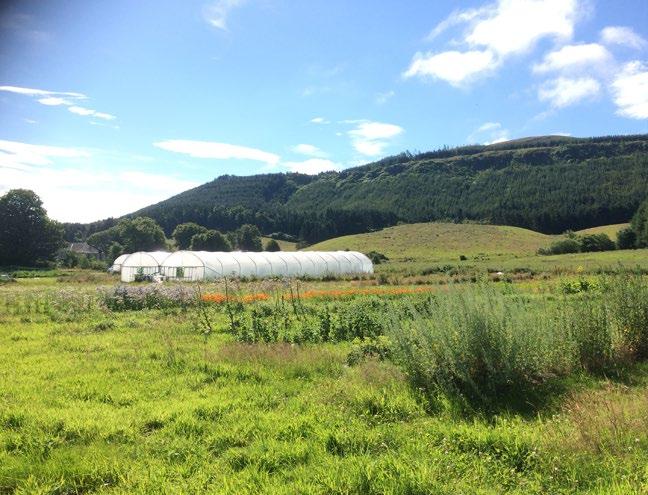

“I feel supported through a connection to many other young farmers who are practising similar methods and through my local community and the Landworkers’ Alliance.”
More recognition of the productivity, diversity and benefits of small scale and agroecological farming methods and how much they contribute towards the food and health system in Scotland is needed. As well as more support for people pursuing businesses and careers in this sector such as access to land, funding and business support.
In the future I plan to develop my business into a social enterprise that can help to educate more people about herbal remedies, make these services available to all income levels and connect more people with the land and plants that can be used to support their health.



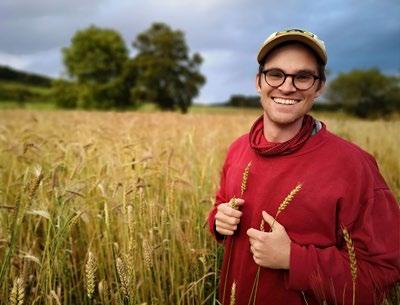

“Land and land-work could be critical to addressing many pressing social, ecological and economic issues.”
I moved back to my family’s 270 acre livestock farm near Invergordon in the Highlands in 2020, having spent the best part of a decade in the South of England, working various jobs and picking up skills in food and farming. Although this spell included working as a butcher, chef, baker, dairy worker and running a commercial veg garden, my work was mainly to do with understanding what is required to grow grain in ecological ways and what infrastructure is required to make local grain economies function. I do a lot of research into what varieties are suitable for this sort of thing (I have tested over 4500 different wheat types) and have done a fair bit of work into different approaches to growing techniques that could work.
Amongst many projects we are building a bakery with a woodfired oven, where we hope to make sourdough bread, pizzas and pies from. We are hoping to get a stone mill to grind our own flour in the next year or so.
AGROECOLOGY
MAKING A POSITIVE CONTRIBUTION
To me agroecology is about working with the land in a way that is productive for humans, whilst leaving space and being sympathetic with the more-thanhuman world. With arable, possibly more so than other farming sectors, this requires a lot of rethinking what is normally accepted as standard practice. It is tricky because you only get one chance to try things every year, so it is a long learning curve.
I come from a very privileged position of having been born into a farming family and have access to farmland. I realised in my early 20’s that land and landwork could be critical to addressing many pressing social, ecological and economic issues and that I had an opportunity to try to make some sort of positive contribution. There is always an incredible amount more that needs doing.
I have always known that this was where I wanted to end up working. The biggest barrier was working out how to make the move back up to the Highlands and my wife finding a career up here which she found exciting and fulfilling. It took a long time!
DEVELOPING REGIONAL AND SHARED INFRASTRUCTURES
I would like to see more support for the development of regional and shared infrastructure that goes beyond the scope, and scale of individual farms and crofts. Processing infrastructure such as regional grain mills and maltings; slaughterhouses and hanging facilities; wool and timber mills; etc that are generally too big to be viable for individual farms but yet linchpins to getting raw product to markets. This is also true things like joined up distribution logistics and aggregation.

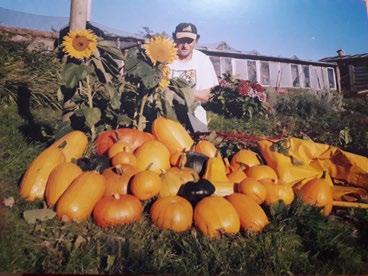



NFU Scotland (N.D), Farming and the food supply chain. Facts about farmers’ position in the supply chain, available at https://www.nfus.org.uk/farming-facts/farming-and-the-foodsupply-chain.aspx.
C Revoredo-Giha and M Costa-Font (LSE Blog, 2020), The UK’s fresh produce supply under COVID-19 and a no-deal Brexit, available at https://blogs.lse.ac.uk/ businessreview/2020/06/22/the-uks-fresh-produce-supply-under-covid-19-and-a-nodeal-brexit/
H Anderson (Whitmuir Community Farm, 2018), Field of Enquiry. A ten-day exploration of food in Scotland and how it impacts on our soil, our health, our livestock, our pockets and our communities, available at http://www.whitmuircommunityfarm.org/wp-content/ uploads/2018/05/FieldofEnquiryReportFinal.pdf.
Nourish Scotland (2018), Food Atlas (2018-2030), available at http://www.nourishscotland. org/wp-content/uploads/2018/08/Food-Atlas_FINAL_online.pdf.
Scottish Government (2019), Review of the environmental and socio-economic barriers and benefits to organic agriculture in Scotland, available at https://www.gov.scot/publications/ review-environmental-socio-economic-barriers-benefits-organic-agriculturescotland/#:~:text=Organic%20production%20still%20accounts%20for,the%20UK%20as%20 a%20whole/
REVIVE (2021), Our Land. A vision for land reform in Scotland and how we get there, available at https://revive.scot/publication/our-land-a-vision-for-land-reform-in-scotlandand-how-we-get-there/; Land Reform Review Group (2014), The Land of Scotland and the Common Good, available at https://www.gov.scot/binaries/content/documents/ govscot/publications/progress-report/2014/05/land-reform-review-groupfinal-report-land-scotland-common-good/documents/00451087-pdf/00451087-pdf/ govscot%3Adocument/00451087.pdf/.
James Hutton Institute (2018), Increasing the Availability of Farmland for New Entrants to Agriculture in Scotland Final report to the Scottish Land Commission (2018), available at https://www.landcommission.gov.scot/downloads/5dd6a2d2ac866_McKee-et-al.-Finalreport-to-SLC-Increasing-land-availability-for-new-entrants-2.5.2018.pdf.
James Hutton Institute (N.D.), Scotland’s soil resource, available at https://www.hutton.ac.uk/ about/facilities/national-soils-archive/scotlands-soil-resource.
Scottish Government (2020), June Agricultural Census 2020, available at https://www.gov. scot/collections/june-scottish-agricultural-census/.
WWF (2019), Delivering on Net Zero: Scottish Agriculture, available at https://www.wwf.org.uk/ sites/default/files/2019-12/WWF%20Net%20Zero%20and%20Farming.pdf.
Farming for 1.5° (2020), A Transformation Pathway, available at https://40a7f11d-664a-4fd7a550-78ec00356167.filesusr.com/ugd/e828e0_59d8fc00569642acac0b21c1cd83186c.pdf. NatureScot (2019), The State of Nature Scotland, available at https://www.nature.scot/sites/ default/files/2019-10/State-of-nature-Report-2019-Scotland-full-report.pdf.

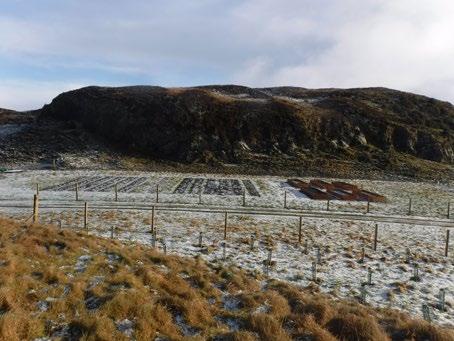

“We hope that policy makers will recognise the true value of the small producer, not only for their produce but also the beneficial effect on the biosphere and as a social enterprise.”
John Fraser, Burnorrachie Vegetables“To me agroecology is about working with the land in a way that is productive for humans, whilst leaving space and being sympathetic with the more-than-human world.”
Col Gordon, Inchindown Farm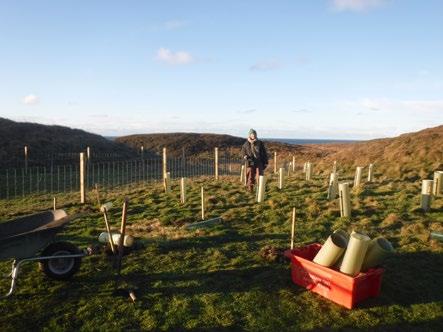
“Our impulse is always to produce food that is healthy for people and heals the Earth.”


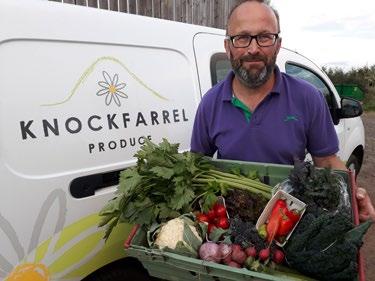
 John Fraser, Burnorrachie Vegetables
John Fraser, Burnorrachie Vegetables
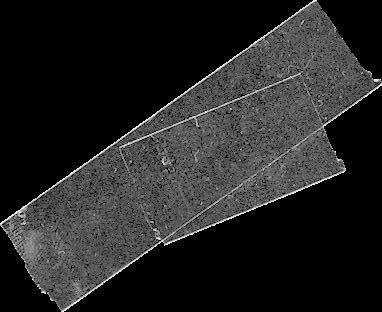
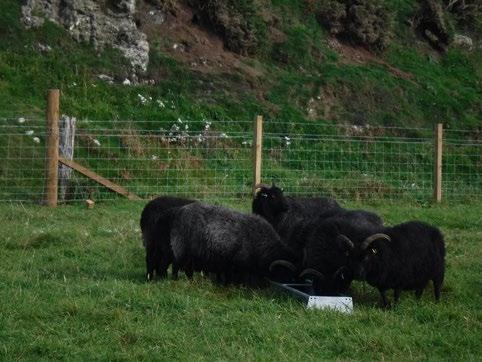



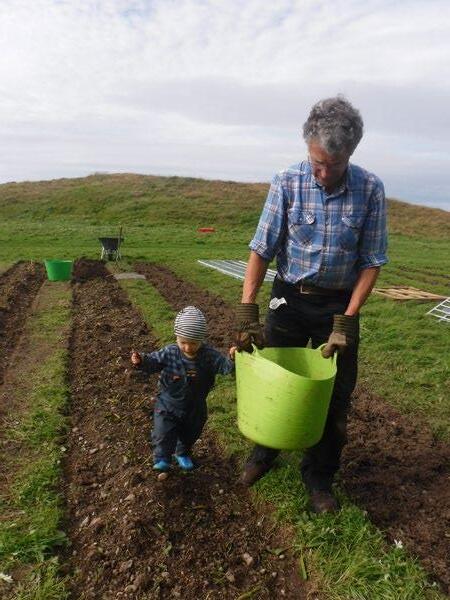
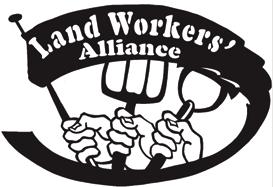


LIZZIE KEENAGHAN, THE WEE CROFT, ISLE OF COLONSAY THIS DOCUMENT HAS BEEN PUBLISHED WITH SUPPORT FROM THE PEBBLE TRUST PHOTOGRAPHS JACQUELINE CROMPTON AND ALEC BROWN, BIODYNAMIC GROWERS HOLY ISLE SOUTH JOHN FRASER, BURNORRACHIE VEGETABLES COL GORDON, INCHINDOWN FARM WILLIAM HOUSTOUN, FARMER IN ANGUS AND SAVORY INSTITUTE ACCREDITED PROFESSIONAL JO HUNT, KNOCKFARREL PRODUCE

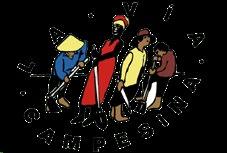
We are members of La Via Campesina, the International Peasant’s Movement, which represents over 200 million peasants, farmers and land-based workers through 182 member organisations.


The activities and achievements of the Landworkers’ Alliance are the result of the skills, passion and commitment of our members and dedicated supporters and allies.

LIZZIE KEENAGHAN, THE WEE CROFT ON COLONSAY ROSY ROSE, ROSY ROSE HERBALIST NIKKI AND JAMES YOXALL, GRAMPIAN GRAZIERS
DESIGN LUCY WATKINS WWW.LUCYELLAWATKINS.COM
SYMBOLS AND ICONS LUIS PRADO, THE NOUN PROJECT AL COOPER, WORLD OF LOGOTYPES

